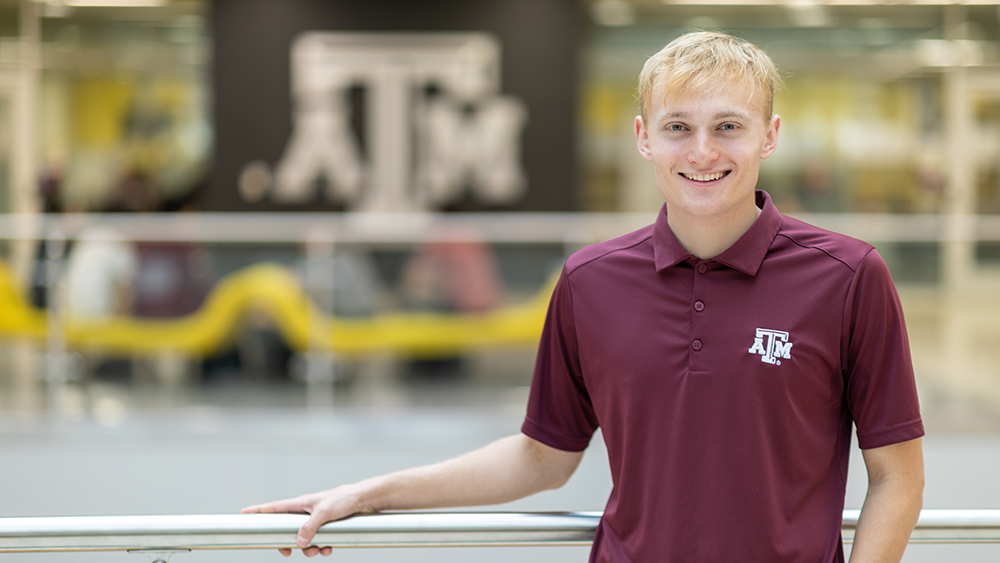
Senior year of high school, Nicholas Ganski never thought he would be a soccer captain, but when his team needed a leader, he stepped up. At an early age, Ganski learned the importance of responsibility and commitment to be someone others could depend on.
“Being a captain was very much out of my comfort zone,” Ganski said. “Every day, people were looking up to me because they were younger than me. And because of that, I had to grow up a little bit to be more mature, take things more seriously. I had to be a leader.”
Now, as an ocean engineering senior at Texas A&M University, Ganski uses the skills he learned on the soccer team to continue to make a difference in people’s lives. As president of the Texas A&M chapter of a worldwide organization, the Society of Naval Architects and Marine Engineers (SNAME), Ganski can do just that.
“Through the organization, industry professionals educate students on topics they may not know about, such as ocean engineering or petroleum offshore engineering,” Ganski said. “The students can also practice their networking, interviewing and speaking skills. In essence, SNAME helps students find a pathway or a better understanding of what exactly they're going to be getting into after they graduate.”
In addition, the fall semester of his senior year, Ganski was the president of Mentorship in Ocean Engineering, an organization that provides professional industry mentors to students in fields such as marine and coastal engineering. His junior year, he was a teaching assistant for four ocean engineering classes where he was able to hone his technical skills and teach younger students.
Success Through Challenges
However, Ganski’s success came after trial and error. After not making the grades he had hoped for his first semester of college, Ganski learned that good grades are achieved through hard work and commitment. In SNAME, he spent months planning an ocean engineering career fair that never came to pass due to various issues. His organization ended up having to apologize to the people and companies involved.
“I was really embarrassed about it last semester,” Ganski said. “But it helped me learn how to deal with people and do better with delegation and things of that nature. I think failure is a natural part of learning as a person. Don't be afraid to fail because you're going to fail sometimes. Just realize that tomorrow is a new day.”
Everything Ganski has experienced, challenges included, is an achievement because he’s building his own path as a first-generation college student. His parents had not attended college, so he questioned whether higher education was possible. One high school history teacher told him that he could do anything if he was willing to put in the work.
“Nobody in my family has ever been to college, so even just being here in the first place is something that I know I'm immensely proud of and my parents are even more proud of,” Ganski said. “I can look back on this in 30 years and realize maybe it wasn't perfect, but it was awesome and unique.”
His advice for other first-generation students is that challenges are a part of life and to not be afraid of taking risks for the potential success they may yield.
“If you're a first-gen student, there's no precedent for you,” Ganski said. “No matter what the outcome is, you have the opportunity to be your own person. You're not held to the constraints of your parents. If you're a first-gen student, being here in the first place is an accomplishment in itself. After that, you really can be whoever you want.”
Finding A Home
At Texas A&M, Ganski found a tight-knit community in the Department of Ocean Engineering. The friendly professors and small classes of people Ganski recognizes after years of being in the department make ocean engineering the right fit for him.
“You walk into your biggest classes and it’s like 60 people,” Ganski said. “The professors know you by name. You can go to their office anytime and chat about more than just school. As someone who doesn't do well with big crowds, having sort of a small community and some consistency in my daily life is really cool for me.”
Ganski found a home not only in the ocean engineering department but at Texas A&M as a whole.
“Texas A&M has a great community and great campus,” Ganski said. “Just because you don't find yourself or where you're supposed to be your first semester doesn't mean you're not going to find it later in college. It took me three years to do it. It may take you a month. It may take you 36 months. But if you go to Texas A&M, you'll find it.”